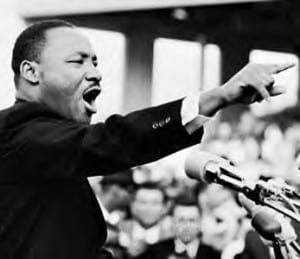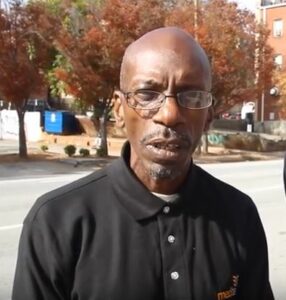
When I had the opportunity of visiting Atlanta for the very first time, my top priority was to visit the Martin Luther King Center and learn about a man clearly characterized by the ministry of reconciliation. That day, I set out to soak in as much as I could about Dr. King’s legacy and the life of the black church that rallied around his leadership during this remarkable period of our nation’s history. As would be expected of anyone taking in the countless displays and watching the historic footage, I was deeply moved and impressed by the events that took place during a time I was too young to appreciate.
However, I also left with the haunting realization that from a gospel perspective, there actually wasn’t anything heroic or radical at all about Dr. King’s life and message. He was simply acting out of what he knew to be faithful to the Word of God. By his reading of the scriptures, things were not the way they were supposed to be. He knew, with biblical clarity, that the preservation of economic prosperity for one group by structurally oppressing another was an abomination to the God of Heaven. Therefore, in speaking truth to power, he was merely giving voice to what the gospel proclaimed as true. In other words, Dr. King was simply being Christian.
This is by no means to diminish the greatness of Dr. King, for indeed he was great. But I wonder if we as the American church prefer to revere Dr. King as a champion of civil rights rather than an obedient servant of the gospel. Do we choose to put him on a pedestal as a way to lessen our own responsibility to speak truth to power in our own day? Could it also be that we have succeeded in reducing the truth to something safe and manageable, absolving us from the kind of risk and sacrifice that the Black church in Montgomery, Birmingham, and Selma endured in Dr. King’s day?
I want to suggest that how we answer this question has serious implications for the ministry of racial reconciliation as the church in America today. As Christians who care deeply about race and poverty, we love the book of Amos. We love it because it is packed with great verses that we use to proof-text our position that God cares for the poor and oppressed. But rarely do we look to Amos to expose our own infidelity. We have become so accustomed to using the Bible to serve our agenda that we no longer expect it to challenge our agenda. We have settled for a “sound-byte theology.” We have lost our theological curiosity, running the serious risk of assuming that we know all there is to know about the gospel. As followers of Jesus, we desperately need to practice saying “I don’t know.” Apart from such humility, our theology will remain shallow. And shallow theology leads to shallow ministry.
We have become so accustomed to using the Bible to serve our agenda that we no longer expect it to challenge our agenda. We have settled for a “sound-byte theology.”
Which leads me to racial reconciliation. My concern is that the prevailing discourse on racial reconciliation has remained entrenched in a theology that addresses sin at the personal but not the systemic level. As a result, racial reconciliation gets largely reduced down to a personal discipleship project. We try to make it practical, like identifying a “person of color” and trying to “befriend” him or her. Or we organize multi-ethnic worship services, making sure that everybody’s ethnic and cultural heritage is somehow recognized and validated. We develop training materials to help individuals explore and confront their personal prejudices and bigotry. And we establish benchmarks or thresholds to measure our progress.
I am not against these things. However, to address racial reconciliation at a purely interpersonal level leaves us blind to the larger powers and principalities. We may love to celebrate diversity and culture, but we’re reluctant to unmask cultural idolatries. We seek to bridge the racial divide, but we fail to confront the powers that propagate it. We cannot claim to embrace racial reconciliation if we are not willing to speak truth to the larger systems and institutions that divide and destroy.
…addressing racial reconciliation at a purely interpersonal level leaves us blind to the larger powers and principalities.
If it matters that blacks and whites worship in the same room, does it also matter that 50 years after the civil rights movement the economic status of African Americans remained at 56% of that of White Americans, or that jail sentences for African Americans averaged six months longer than for white Americans for the exact same crime? As those called to welcome the stranger in our midst, can we remain silent while lawmakers draw up legislation that threatens immigrants? Or does our theology of creation allow us to treat fellow human beings as mere economic commodities?
And lastly, as brothers and sisters in Christ, can we raise questions about U.S. foreign and domestic policies and the use of force without being immediately written off as unpatriotic or anti-American? Our partisan identities have sabotaged our ability to bring our collective Christian conscience to the looming issues of the day. We must ask ourselves why we as the American church have so much to say about sex, but so little to say about violence.
I would argue adamantly that it is a huge mistake to deny a connection between our U.S. foreign policy and racial injustice. We cannot remain apathetic to the disproportionate representation of poor, ethnic minorities in the military, or the fact that bi-partisan legislation was passed to give the military unimpeded access to the contact information of all public high schools, which is made up of 88% ethnic minorities in the urban centers of the United States. Also ironic is that this piece of legislation was quietly embedded within an education bill we now know as No Child Left Behind.
We cannot claim to love our neighbor as ourselves while turning a blind eye to the thousands of Arab-American citizens who continue to be racially profiled, questioned, deported, or detained without legal representation. We must as Christians reject the notion that governments can define for us what evil is, or determine who our enemies are.
As a Christian, Dr. King refused to draw an artificial line between civil rights and foreign policy. I close with a quote from a speech King delivered to a group of concerned laity and clergy leaders during the Vietnam War:
Beyond the calling of race or nation or creed is the vocation of sonship and brotherhood, and because I believe that the Father is deeply concerned especially for his suffering, helpless and outcast children, I come tonight to speak for them. This I believe to be the privilege and burden of all of us who deem ourselves bound by allegiances and loyalties which are broader and deeper than nationalism and which go beyond our nation’s self-defined goals and positions. We are called to speak for the weak, for the voiceless victims of our nation and for those it calls enemy, for no document from human hands can make these humans any less our brothers.
Craig Wong is a minister-at-large for Grace Fellowship Community Church, a Presbyterian congregation in San Francisco’s Mission District. He is a former InterVarsity campus staff worker and board member of the Christian Community Development Association, a national association of church-based urban ministries. He currently serves on the board of Dayspring Technologies, a gospel-centered technology company and, along with his wife Tina, raises a family of four in “the City by the Bay.” He delivered this as a panel address on Racial Reconciliation at the CCDA Conference in Atlanta, GA. Sign up to receive updates from his blog.



One Response
Diversity is the antithesis of a hoeoomngus population. While I think the most common association with diversity is race, skin color, the late 20th and early 21st centuries have enabled society to recognize the broad range of diversity inherent in humanity. “Diversity” includes, but is not limited to, one’s race, one’s faith or religion, one’s heritage, and one’s sexual orientation.We need diversity because it is what makes us human. The world is composed of innumerable cultures with unique beliefs and practices. While over the course of history, society has enforced the Marxist argument that a ruling class seeks to oppress others, seeks to limit diversity, without diversity humanity would be comparable to robots – each with the same appearance, beliefs and ideas. It is therefore diversity that stimulates us and broadens our worldview and capacity for empathy. Recognizing diversity exposes us to knew ideas and beliefs. It challenges us to stray from our comfort zones, but in doing so it improves humanity by demolishing social barriers that are created by stereotypes. Without diversity, life would not be interesting or stimulating.Diversity has taken on new importance in my generation. My peers and I will soon be navigating an ever-increasing globalized world. Technological advances have made traveling easy and popular, and the desire to explore is rampant among young people. Society has shifted to value individuals who are competent in more than one language, and this skill is reinforced by immersing oneself in diverse cultures, by soaking up all of the cultural experiences that one has an opportunity to. In order to succeed in the future, my generation must embrace diversity and open ourselves up to new cultures, languages, and ideas.Though my personal experience does not include much diversity, I consider myself to have a very open mind and to be eager to experiencing diversity through traveling and relating to other as human beings, not as individuals who fit stereotypes. As a white female attending a largely hoeoomngus campus, I am not necessarily exposed to diversity everyday, but that does not mean that I am not willing. I think this concept is common among many Saint Anselm students. Though our college is traditionally composed of white Anglo-Saxon students, I think this is largely a product of its location. One hundred years ago, most students were of French-Canadian descent due to Manchester’s population. However, I think the campus is ready and willing to reflect the changing world that it is a part of.